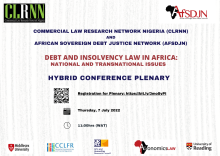New AfSDJN Policy Brief focuses on Debt, Climate Finance and Vulnerability for Countries in Africa
There is a correlation between climate change, climate finance, and unsustainable debt levels in Africa. In this African Sovereign Debt Justice Network (AfSDJN) Brief, we highlight this connection focusing on eight countries in debt distress currently (Chad, The Republic of Congo, Mozambique, Sao Tome and Principe, Somalia, Sudan, Zambia, and Zimbabwe) and one highly indebted country (Ethiopia) in sub-Saharan Africa. These countries (referred to here as Debt and Climate Vulnerable (DCV) countries) are also some of the most climate vulnerable countries despite having some of the least carbon footprints.


